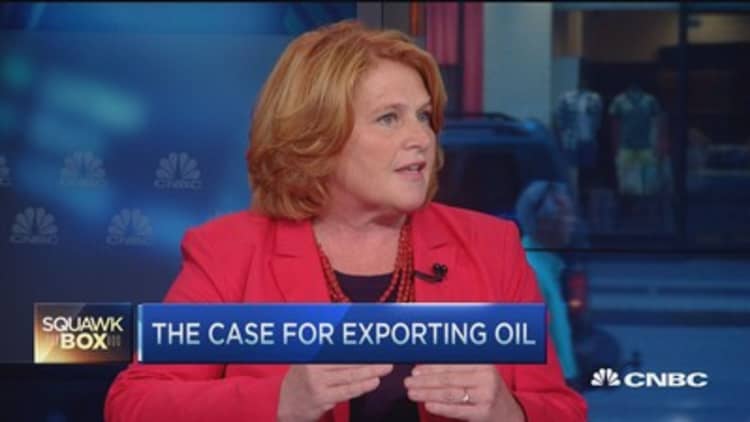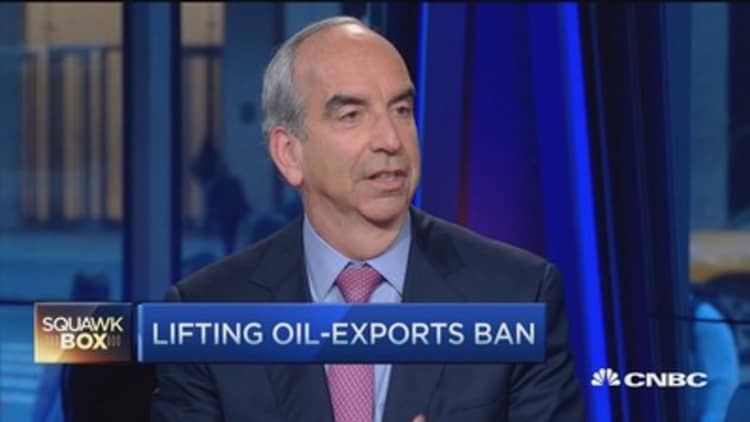
Allowing the export of U.S. crude would help level the playing field against foreign producers that have a lock on refining capacity in America, oil billionaire Harold Hamm said Monday—a move he argued would lower prices for consumers.
A longtime advocate for lifting the ban, Hamm described the problem facing U.S. oil companies during a CNBC "Squawk Box" interview.
In the late 1980s, foreign producers from Venezuela, Mexico, Saudi Arabia and Canada bought refineries on the cheap in the U.S. "when it looked like we had run out of oil," said the founder of Continental Resources.
Since then, he added, they've configured "two-thirds of our refining complex" to process their heavier type of oil, which contains a higher percentage of impurities, rather than the lighter crude produced in the U.S.
"With the oil renaissance that's come about here in American due to horizontal drilling, we have the resource developed and we should be exporting," Hamm said. Exploration in the Bakken Shale rock formation, which occupies about 200,000 square miles in North Dakota, Montana and Canada, has been at the leading edge of that renaissance. Continental Resources is the No. 2 producer in the Bakken.
In a Wall Street Journal op-ed, Hamm argued that lifting the U.S. oil export ban would lower prices for Americans:
"Exporting oil would not drive up prices at the pump. American drivers buy refined products, which the U.S. already exports. Many studies—from a range of institutions and government agencies, including the Congressional Budget Office and the Energy Information Administration—have shown that lifting the export ban could actually lower gas prices."
Appearing with Hamm on "Squawk Box" Monday, Sen. Heidi Heitkamp, D-N.D., said the export ban puts artificial restrictions on the market that distort prices—pushing back against critics who say a repeal would lead to higher prices.
"I don't know in what world increasing the global supply is actually going to raise the price," Heitkamp argued. "The more supply we can get into the marketplace, especially into Europe, the lower the international price is going to be."
"The price that our refiners are pricing their refined product on is the international global price," represented by costlier Brent crude not U.S. oil's West Texas Intermediate yardstick," she added.
"If you can sell the U.S. crude at a global price and eliminate that artificial differential ... it would increase the cash flow for companies like my companies," said Ryan Lance, chairman and CEO of No. 7 Bakken producer ConocoPhillips. "Reinvestment would go back into the business and drive more production down the road," he told CNBC.

"Our oil is literally trapped here because of the ban. Inventories in the last year have gone from 350 million barrels to 470 million barrels," Hess CEO John Hess told CNBC. Hess is the third-largest producer in the Bakken. "The impact of this ban ... is crippling U.S. producers disproportionately to producers against the rest of the world."
Hoping to end the ban, a bipartisan measure currently being pushed by Heitkamp and Senate Energy Committee Chairwoman Sen. Lisa Murkowski, R-Alaska, would lift the restrictions Congress passed in 1975 after the Arab oil embargo created fears of global shortages.
On another front, Murkowski is urging President Barack Obama to use exemption powers granted under the current export ban to allow U.S. producers to send oil to certain countries in need.
Earlier this month, a call-to-action-report from the Alaska senator's office offered an explanation.
"While legislative efforts aimed at full repeal of crude oil export restrictions progress in Congress, the administration retains broad authority to allow greater exports to U.S. allies that request exemptions from those restrictions. ... A national interest finding by the President could be implemented immediately by the Department of Commerce and exports could set sail as soon as the commercial and logistical arrangements were made."


